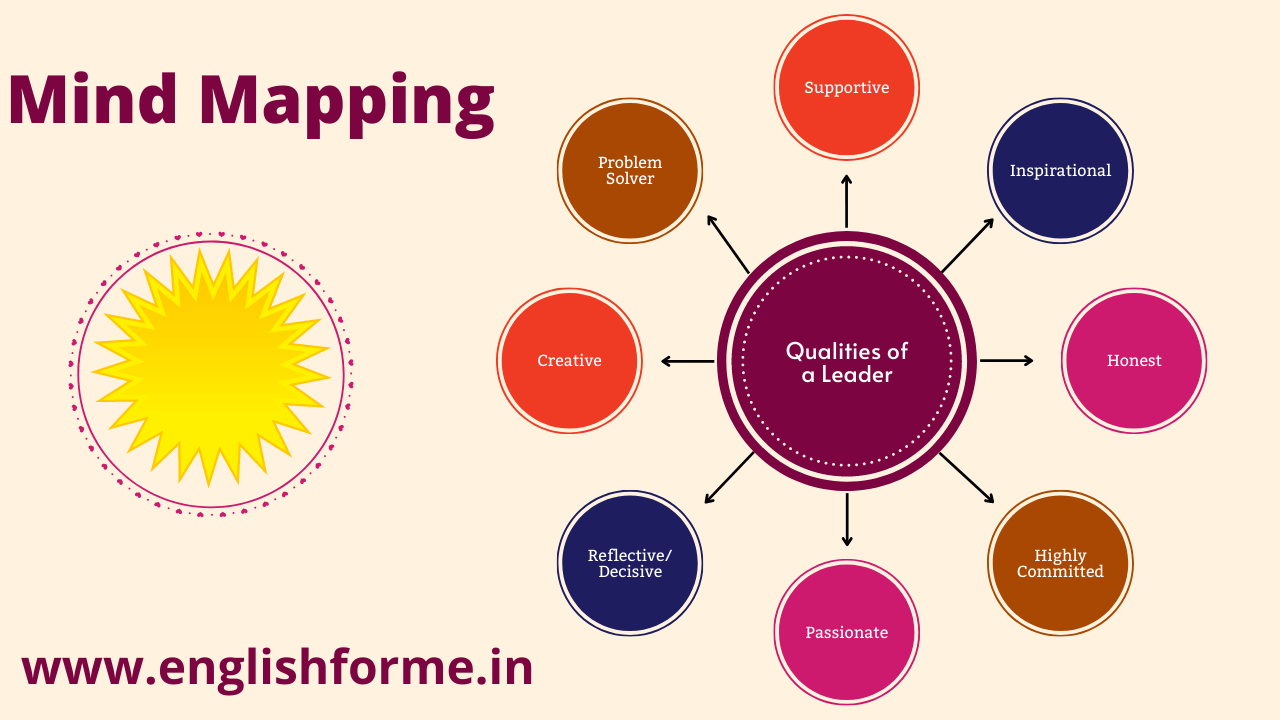Mind Mapping
Mind mapping is a visual technique used to organize and represent information, ideas, or concepts. It’s a diagram that typically starts with a central idea or topic, and branches out into related subtopics and associations. Here’s how to create a basic mind map:
- Start with a central idea or topic: Write it in the center of your page.
- Create branches: From the central idea, draw branches outward to represent main categories or subtopics related to the central idea.
- Add keywords or images: On each branch, add keywords or simple images to represent the main points or ideas related to that branch.
- Further sub-branches: For each subtopic, you can create additional branches or sub-branches to dive deeper into details.
- Use colors and visuals: Incorporate colors, icons, or images to make your mind map more visually engaging and easier to understand. (Colours not allowed in exam.)
- Connect branches: Use lines to connect related ideas, showing the connections and relationships between different elements.
- Keep it simple: Mind maps are meant to be quick, visual aids for organizing thoughts and information, so keep them concise and easy to follow. 1. मध्यवर्ती कल्पना किंवा विषयासह प्रारंभ करा: ते तुमच्या पृष्ठाच्या मध्यभागी लिहा.
2. शाखा तयार करा: मध्यवर्ती कल्पनेतून, मध्यवर्ती कल्पनेशी संबंधित मुख्य श्रेणी किंवा उपविषयांचे प्रतिनिधित्व करण्यासाठी शाखा बाहेरून काढा.
3. कीवर्ड किंवा प्रतिमा जोडा: प्रत्येक शाखेवर, त्या शाखेशी संबंधित मुख्य मुद्दे किंवा कल्पनांचे प्रतिनिधित्व करण्यासाठी कीवर्ड किंवा साध्या प्रतिमा जोडा.
4. पुढील उप-शाखा: प्रत्येक उपविषयासाठी, तपशीलांमध्ये खोलवर जाण्यासाठी तुम्ही अतिरिक्त शाखा किंवा उप-शाखा तयार करू शकता.
5. रंग आणि व्हिज्युअल वापरा: तुमच्या मनाचा नकाशा अधिक दृष्यदृष्ट्या आकर्षक आणि समजण्यास सुलभ करण्यासाठी रंग, चिन्ह किंवा प्रतिमा समाविष्ट करा.
6. शाखा कनेक्ट करा: संबंधित कल्पना जोडण्यासाठी रेषा वापरा, भिन्न घटकांमधील कनेक्शन आणि संबंध दर्शवा.
7. साधे ठेवा: मनाचे नकाशे हे विचार आणि माहिती व्यवस्थित करण्यासाठी झटपट, व्हिज्युअल सहाय्यक आहेत, म्हणून ते संक्षिप्त आणि अनुसरण करण्यास सोपे ठेवा.
Mind maps are useful for brainstorming, note-taking, problem-solving, and organizing complex information in a structured, visual way. There are various digital tools available for creating mind maps, or you can draw them by hand on paper or a whiteboard.
Mind Mapping Questions and Answers
Mind mapping is a communication skill type question added in the Std 12 English Maharashtra State Board. Here are some exclusive examples and sample of mind mapping.
Draw a mind map on ‘Reusable and Organic Straws’
Draw a mind map on ‘Benefits of Games and Sports .
Draw a mind map on Business Plan with the help of following points planning, research, marketing, sales and profit
Use your imagination to make Mind Map creative and effective. See the following diagram. Learning of software programming.
Q.2. (C) Mind Mapping: Develop a mind mapping frame/design to show the variety of sports to the students, y can take the help of the following points in order to develop each of them into furt branches. (Individual sports, water sport, contact sport, team sports etc.)
Sports
|
Individual Sports
/ | \
Running Gymnastics Tennis
| | |
Sprinting Artistic Singles
Gymnastics
|
Water Sports
/ | \
Swimming Surfing Rowing
| |
Freestyle Sculling
|
Contact Sports
/ | \
Football Boxing Martial Arts
| |
Tackling Punching/Kicking
|
Team Sports
/ | \
Soccer Basketball Volleyball
| |
Passing Jumping
Prapare a mind map on the topic Human Interest using ideas, flow, design, and structure.
Mind Mapping on Soft Skills
Mind Mapping on Personality Development
Here’s a breakdown of a mind map for Personality Development. You can visualize this with a central bubble titled “Personality Development” and several branches extending out with subtopics. Read the following points, remember and draw a Mind Mapping on Personality Development of your own.
- Self-awareness
Understanding strengths and weaknesses
Emotional intelligence
Self-reflection
Mindfulness
Personal values and beliefs
- Communication Skills
Verbal and non-verbal communication
Listening skills
Public speaking
Body language
Assertiveness vs. aggression
- Confidence Building
Positive self-talk
Overcoming fear and anxiety
Developing self-esteem
Accepting compliments
Celebrating small wins
- Emotional Stability
Managing stress
Coping with failure
Building resilience
Emotional control
Empathy
- Social Skills
Building relationships
Teamwork and collaboration
Conflict resolution
Networking
Cultural sensitivity
- Professional Skills
Time management
Decision-making
Problem-solving
Leadership development
Adaptability to change
- Personal Growth
Setting and achieving goals
Continuous learning
Developing new hobbies
Discipline and self-motivation
Work-life balance
- Positive Thinking
Attitude of gratitude
Optimism vs. pessimism
Overcoming negativity
Visualization techniques
Affirmations

Fantastic!
Nicely designed.
Thank you.
Very very nice,,,Sir
Thank you!
Quite useful, sir
Thank you.
Nice Work, sir!
Thank you 🙏